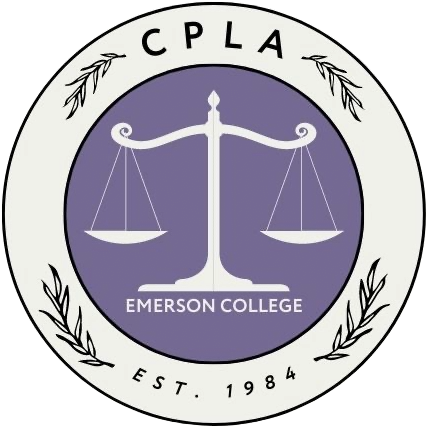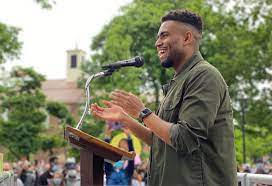Cut The Faucet Off First: An Interview with Niko Emack
Our country has been going through a long-term battle with over-policing and militarized police departments since the time of Slavery in the United States. Police departments were formed in the 1700s as “Slave Patrols” to track down slaves and bring them back to their owners; their tactics were fear and intimidation to subdue slaves trying to rise to power. I sat down and interviewed Professor Niko Emack, a current professor at Emerson College and alumni who graduated in 2018 with a degree in Political Communications. Emack is a Harvard graduate student studying in the School of Education who has been published numerous times by agencies such as the Boston Globe, NPR, and Foreign Policy, with article topics ranging through topics on the intersections of politics, sports, culture, and identity. Along with his accolades, he is an avid activist who has partnered with multiple African-American groups in Massachusetts to focus on the empowerment of the youth. Some programs include My Brother’s Keeper Cambridge, a non-profit focused on race and equity. Another includes the MBK Summer Empowerment Program, a paid opportunity for high school-aged kids to learn about social justice, financial literacy, and mental health. Most recently he led community walks on Martin Luther King Jr. Day, challenging residents to view Cambridge’s inequities through Dr. King’s eyes.
While talking to Emack, he mentioned that although the word “activist” does describe him, it is not a dirty word. He came into the world of activism to share his lived experience and to help his community tackle issues that fall into human rights, not for the title of an activist. His work is personal to him – it gets him up in the morning and is the last thing he thinks about at night. His involvement in politics and activism is geared heavily toward using education for the civil liberties he is fighting for.
He started his work in journalism, which he sees as a form of teaching to tell stories to spread a message of rights for marginalized communities and identities while working at his first job after college: writing for NPR. His journey then moved him to work at the State House and for the city of Cambridge, working towards the same goals he was expressing in his writing at NPR. This time, it was through a political communications lens. Emack has been using American policy to educate and fight for the civil liberties of city residents and has found more than one platform to spread awareness and educate whether it is a speech, a tweet, or in the classroom.
“I had my head in the sand trying to fix issues of policy, law, and government. But I realized over time that you couldn’t shift policy until you shifted culture,” Emack said. He expressed that being able to make a change means that “you need the education to be the starting factor in the long clothesline of modification to our government.”
Learning about the origins of policing in this country shines a light on how the roots of policing stem from racism. Emack further explained that these patrols didn’t have the only goal of returning property, but to intimidate and instill fear of future uprisings. Scare tactics and over-policing of Black bodies are still going on today, one-hundred-sixty years after slavery has been proclaimed abolished. He goes on to explain that the narrative of the hometown sheriff has shifted after the attacks of September 11, 2001, to no longer worrying about stopping the local criminals or petty crime, but the police initiative became about counterterrorism.
During the interview, we went on to discuss systemic racism in the world of policing and police accountability after violent incidents with citizens. Police are not being held accountable for their violence, which gives no initiative to stop participating in these acts. According to the Mapping Police Violence Database, 98.1% of police are either acquitted, found innocent, or no formal charges are being brought against them. A large part of the conversation about over-policing is finding a way to hold these officers accountable for what they have done democratically. Without accountability for these killings, there will be no way to stop them from occurring. Currently, officers have little to no consequences and can return to duty or remain on staff after multiple offenses and violations allowing them to commit more violent acts. Until the dynamics and discretionary powers of police departments change, we will continue to hear the same stories of violence.
When we look at the words used to describe violent policing such as militarized, Emack says, “When you are a hammer everything is a nail,”. He goes on to explain that the problematic approach to policing doesn’t center on the community, it creates a scenario where everyone, primarily people of color, are viewed as potential targets. Instead of protecting the community as first regard, officers have been in a mindset that they have to do anything in their power to defend their life when in actuality their oath is not to betray their integrity, character, or public trust. When you approach the world with this mindset, of a hammer, then the entire world becomes a target, a nail.
Emack and I close the interview by discussing what “social Niko” wants versus what he can accomplish over time. He believes that under the endorsement of capitalism, there is always going to be someone at the bottom of that financial chain, exploiting those below. Emack knows we cannot accomplish his goals by tomorrow and so his personal views are not always the first thing he enters into the political space because more steps need to be taken before we can reach big goals. Politics is a long-term and multi-step institution, beginning with what “dominos” can be knocked down first in the light of public safety, such as having every officer on duty wearing body cameras or changing our ways to hold police accountable for their actions.
“Everyone wants to defund right away, I think that is necessary but, can we at least cut the faucet off first,” Emack said. Although that idea is not as progressive as some would hope, “politics is a small moving boat,” as Emack has said, and making big changes happen immediately is almost impossible. But he hopes through education and the activism space there can be more people involved and thinking about the idea of creating a safer community.
The reality of our political landscape is the ability to chip away at our goals and the ability to get anywhere other than chipping away is limited so Emack focuses on the experience he has had in political and public spaces, trying to make a difference in the best way he knows how. Emack encourages young voices to use their privilege and spotlight to go against the status quo and although marginalized communities are the backbone of most political battles, allyship can have momentous movement in conflicts that cannot be fought alone.

